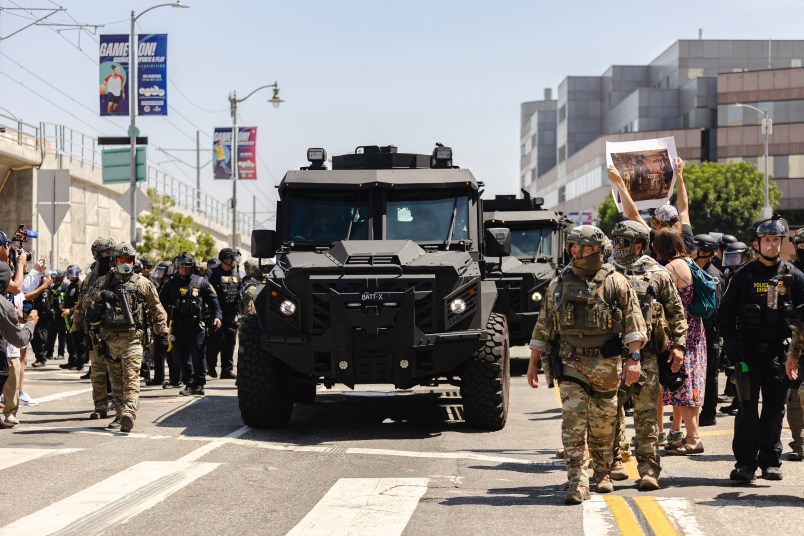A panel on the Ninth Circuit Court of Appeals seemed inclined on Tuesday to keep President Trump in charge of the California National Guard, with judges pressing into just how little justification the White House needs to provide for sending troops into American cities.
The arguments reached their peak early on when Brett Shumate, assistant attorney general for the DOJ’s civil division, told the panel that Trump “certainly could” call up troops only because he was unhappy with how many ICE officers he had. The courts, Shumate argued, would be powerless to do anything about it: the determination about when to federalize state National Guard units is up to the White House and unreviewable by judges, he argued.
It’s an argument that would be stunning for any other administration. For Trump, it’s normal. Doubling down on arguments that would get you laughed out of middle school civics – it’s legal for the President to use the military in the U.S. wherever he wants, whenever he wants, and nobody can stop him – has become a deadeningly typical feature of the administration’s approach to cases around some of its most authoritarian acts.
In this case, the three judge panel seemed to indicate that while Trump was pushing the envelope, they would be unlikely to allow a lower court’s order that the President unlawfully federalized the California Guard to go into effect as the case is heard. Two of the judges on the panel, Mark Bennett and Eric Miller, were appointed by Trump; the third judge, Jennifer Sung, was a Biden appointee, and appeared skeptical of counsel for the state of California, Samuel Harbourt.
At one point, Harbourt argued that the courts could look at the factual basis for Trump’s decision-making. That argument would open his move to federalize the National Guard up to significant judicial scrutiny, while also making it potentially more likely that the appeals court would keep alive the lower court order, which examined closely whether Trump’s claims about chaos in LA were grounded in facts.
But Sung, the Biden appointee, shot that down.
“If we were writing on a blank slate, I would tend to agree with you,” she said, adding later that “we are not.”
Early on in the arguments, Shumate also argued that Trump could call up every National Guard unit from every state and the District of Columbia: all 51.
That assertion came in response to a series of skeptical questions from Judges Bennett and Miller.
Bennett asked how extreme a President’s behavior would have to be in federalizing National Guard units before a court could get involved. Could the federalizations all be on the basis of dissatisfaction with ICE staffing levels? What if such a problem only existed in one state, California? What if the President offered no justification?
In all of those cases, Shumate’s answer was the same: “the President gets to decide.”







If POTUS gets to decide that there is problem anywhere in the US, and thus has the authority and power to mitigate the problem with the National Guard then why do we need judges. These three seem to want to willingly hand over more power to someone who has a proven record of lying.
Lip filler gone bad? Or has some silicone shifted?
D’OH!
Both sides presented their arguments about as poorly as they possibly could have, but I’m particularly disappointed with the state’s presentation. Just defend the district court’s very detailed opinion! There was no need to retreat into a bunch of esoteric gobbledygook.